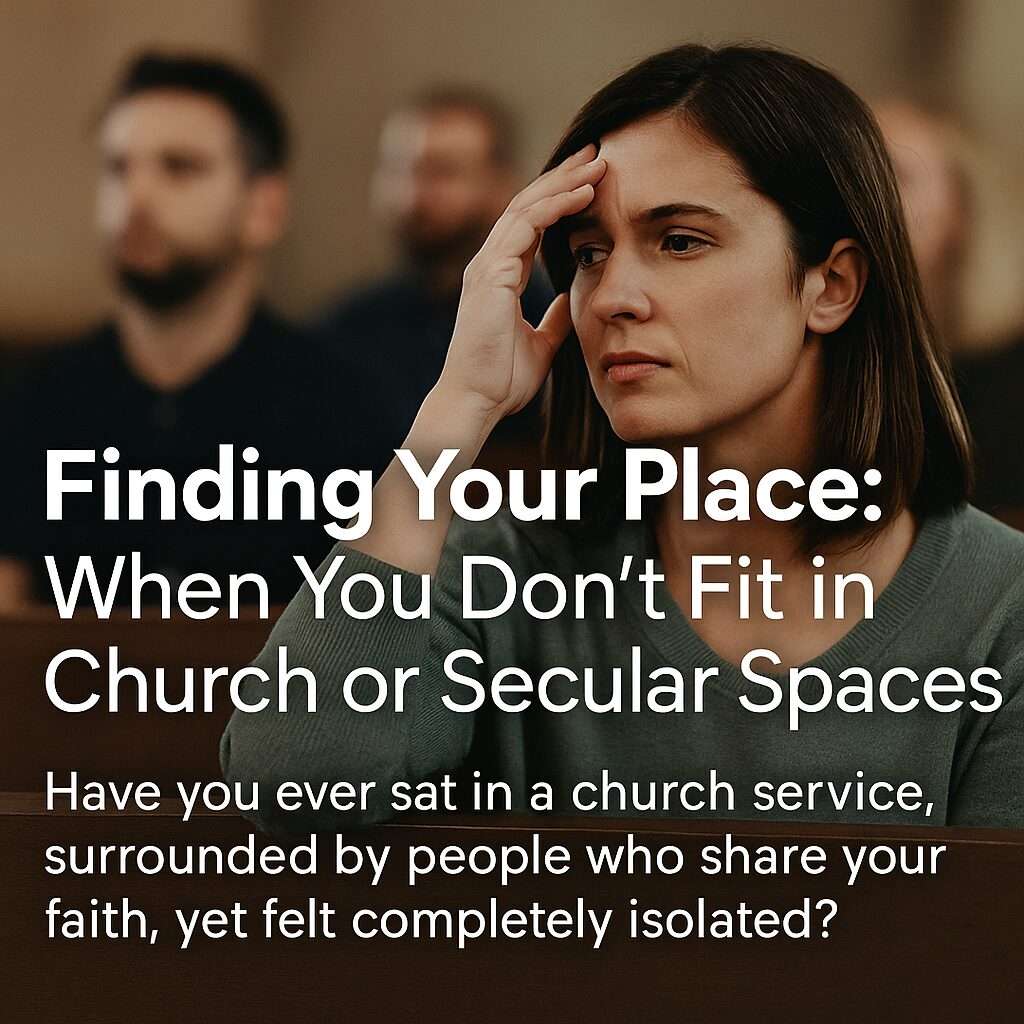Have you ever sat in a church service, surrounded by people who share your faith, yet felt completely isolated? Or perhaps you’ve been at a workplace gathering where everyone seems perfectly comfortable with conversations that make you deeply uncomfortable?
That persistent feeling of being caught between worlds isn’t just uncomfortable—it can be profoundly disorienting. When you don’t quite fit in religious circles but also feel out of place in secular environments, it’s easy to question where you belong at all.
The Uncomfortable Middle Ground
This in-between space has become increasingly common as our culture fragments into increasingly polarized groups. Christians who ask honest questions can feel judged in church settings, while their faith convictions might make them seem rigid or judgmental to non-religious friends.
The struggle is real because it touches on our fundamental need for belonging. We all need community—places where we can be authentic without fear of rejection. Yet many find themselves editing different parts of their identity depending on which group they’re with.
Some common experiences include:
- Feeling too “worldly” for church circles but too “religious” for secular spaces
- Being afraid to voice doubts or questions at church
- Having to defend your moral boundaries in secular environments
- Feeling like you have to choose between your faith and your other interests or relationships
- Exhaustion from constantly code-switching between different social contexts
The False Maps We Follow
Like Bob in “THE CALL,” many of us have been handed maps that promise to lead us to belonging. These maps might tell us:
- “If you just believe the right things and follow all the rules, you’ll fit perfectly in church.”
- “If you just loosen up about your convictions, you’ll be accepted in secular spaces.”
- “The solution is finding the perfect group where everyone thinks exactly like you.”
But these maps are fundamentally flawed, built on a misunderstanding of true identity and belonging.
True belonging isn’t about fitting perfectly into any human-created system. It’s about living authentically from who you truly are, regardless of whether that wins approval from any particular group.
The Real Issue: Identity Before Belonging
The root issue isn’t about finding the right group—it’s about discovering your true identity first.
In “THE CALL,” Bob realizes he’s been climbing a mountain of achievement and acceptance his entire life, driven by a desperate need to belong. But his breakthrough comes when he discovers something profound: he already belongs. His identity isn’t something to achieve through others’ approval; it’s something to receive and live from.
This is the transformative truth many Christians intellectually know but struggle to live from: your primary identity comes from being a beloved child of God—not from fitting into any human system, religious or otherwise.
From this place of security, you can:
- Bring your whole self to every environment without needing everyone’s approval
- Hold your convictions with both confidence and humility
- Connect authentically with others across different belief systems
- Create new spaces where others like you can find community
Finding Your True Community
When you live from this secure identity, you’ll likely find that your approach to community changes in these ways:
1. Quality Over Quantity
Instead of trying to fit perfectly into large groups, focus on finding a few relationships where you can be fully known and accepted. Even within churches or workplaces where you may feel like an outsider, there are often individuals who share your experience.
2. Creating What You Cannot Find
Sometimes the community you need doesn’t exist yet—which means you might be called to create it. Small groups, book clubs, service projects, or even informal gatherings can become places where others who feel “in between” can find connection.
3. Embracing Your Bridge-Building Role
People who don’t fit neatly into categories often serve as bridges between different worlds. This position, while sometimes lonely, allows you to translate between different groups and help others understand perspectives they might never otherwise encounter.
4. Finding Peace in Your Uniqueness
The discomfort of not fitting in perfectly anywhere can actually be a gift—a reminder that your ultimate belonging isn’t found in human systems but in a deeper identity that no group can give or take away.
Practical Steps Forward
If you’re currently struggling with not fitting in church or secular spaces:
- Examine your expectations: Are you seeking perfect belonging from human communities?
- Identify your non-negotiables: What core values and beliefs make up your authentic self?
- Start small: Look for just one or two relationships where you can be fully yourself
- Find connection through action: Often, working alongside others toward a common goal creates deeper bonds than just socializing
- Be patient with yourself: Learning to live from your true identity rather than seeking approval is a process
- Consider if you’re being called to lead: Your discomfort might be preparing you to create spaces for others who feel similarly
Remember that Jesus himself was frequently criticized for not fitting neatly into the religious categories of his day. He was too radical for the religious establishment yet maintained uncompromising convictions. His belonging came not from human approval but from his relationship with the Father.
Like the mountain climber in “THE CALL,” you may discover that true belonging isn’t found at the top of any achievement or acceptance mountain. It’s found in the liberating truth that you already belong to God, and from that place of security, you can navigate any social landscape with grace and authenticity.
Want to go deeper? THE CALL is a Kingdom parable that gently exposes why you still feel spiritually drained despite all your achievements—and leads you into true identity, rest, and purpose. Experience the freedom of knowing who you really are. Special FREE offer, pay for shipping only. Get your copy today at: www. graceempoweredliving.com/call
